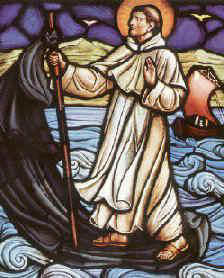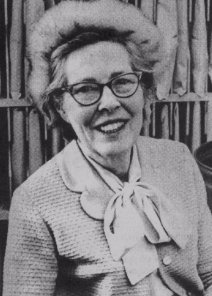|
To work for the proper implementation of canon law is to play an extraordinarily constructive role in continuing the redemptive mission of Christ. Pope John Paul II |
|
|
|
|
Resolution 1152 x 864 |
Updated 10 jan 2013 |
Effie Quay, Pro-Life
Pioneer, Marks 90th
Birthday |
|
|
|
|
|
Once an Ardent Atheist
Effie Alley was born in 1899 in the Oklahoma Territories. She was raised as a Methodist, but after graduation from the University of Arkansas, she became and remained for many years an ardent atheist. She held several jobs as a newspaper reporter before finally moving to Chicago where she met and married a young Catholic attorney by the name of Eugene Quay in 1923. A son Paul Michael was born in the next year, and a daughter Clare four years later.
Paul Quay, now a Jesuit theologian at Loyola University of Chicago and a renowned pro-life author in his own right, said that he and his sister were raised as Catholics, even though his mother at that time did not share her husband's faith. Said Paul, “My mother made a promise at the time of her marriage to raise her children as Catholics, and she is a woman of her word.” He also noted that although her skills as a writer were much in demand, she elected to stay home with her children until they reached high school age.
After resuming her work as a
reporter who specialized in science and medical issues for several Chicago
newspapers, she established a solid reputation for accuracy and acumen. Her
demonstrated skills led to assignments on several noteworthy and highly
charged medical stories, and her reports met
with wide acclaim. This hard-won reputation for investigative ability in medical
affairs would serve her well when she
turned her attention to pro-life issues in later years. The Quay family faced
tragedy in 1948 when daughter Clare died from injuries sustained in an
automobile accident. But some two years later, a wide variety of factors,
according to her son, eventually led Effie Quay to enter the Catholic Church in
whose communion and service she has remained for the past 40 years. Following
her conversion to the Faith, Effie Quay, wife, mother, and journalist, was
poised to enter the fray of abortionism.
Then a
Champion of the Pre-born
The 1950s and 1960s, as we now know, saw the gathering of the clouds of abortionism, but in those days the struggle was still a hidden one, being fought for the most part in the elite circles of American law and medicine. Of course, law and medicine were specialties of Eugene and Effie Quay. Eugene, by now an accomplished attorney and co-founder of the Georgetown Law Review, was a member of the extremely influential American Law Institute, where he was virtually alone in fighting the introduction of abortion-abetting language into American jurisprudence.
Throughout those trying years, Effie constantly supported and encouraged her husband's largely unheralded efforts. And as the years passed and Eugene Quay's eyesight weakened, she took on the additional difficult task of legal research and writing under his direction, a sacrifice that enabled her husband to continue his value pro-life contributions for several more years. Finally, in 1972, after more than a dozen years of intensive work on behalf of the life issues, Eugene died. But Effie, although well into the years in which most people are enjoying retirement, was about to enter what has been perhaps her most fruitful time as a champion of the unborn.
On Jan. 22nd, 1973, the Supreme Court ruined Effie Quay’s 74th birthday, with the only silver lining being that Eugene had been spared from seeing this ultimate expression of judicial tyranny. Amid Effie's busy writing and speaking efforts against abortion itself, however, her reporter's instinct sensed almost from the outset that abortionism was going to usher in a second assault on the innocent, namely the scourge of infanticide. The vehement denials of the abortion profiteers notwithstanding, she set about compiling the damning evidence of the abortoinfanticide complex, and by 1977 was ready to publish the first edition of her most widely read prolife study, And Now Infanticide. A second edition appeared in 1980 and has sold over 35,000 copies. Historians of the pro-life movement generally recognize Mrs. Quay's study of infanticide to have been the first comprehensive treatment of the subject ever published.
Gerald and Helen Brunning, founders of Sun Life Publications under whose imprint And Now Infanticide was released, only met Effie Quay one time (in 1976), “but our correspondence and phone conversations since that time have been delightful. She is a wonderful writer to work with. Her material itself is so good from the start, and if we want to suggest something here or there, she's always quite open to the idea.” The facts related in And Now Infanticide were chilling, but Quay's solid professional reputation made them impossible to dismiss. “Right-to-life groups picked up on her book, of course,” said the Brunnings, “but so did quite a few libraries and physicians' groups.” As her study of infanticide received more attention, Effie Quay's other articles and reviews in defense of life appeared in a variety of publications, including many in The Wanderer, Fidelity, The Human Life Review, and The Hillsdale Review. Her vast personal correspondence with numerous policy makers, meanwhile, itself a remarkable apostolate, continued to reap much hidden fruit.
Although the defense of innocent
life has always been closest to her heart, Effie Quay's writing skills have been
put to use on many other topics, including such various concerns as liturgical
language issues and the notion of true femininity. Through the years, moreover,
she has taken time to encourage younger writers as they learn to put their
talents at the service of the Church and the innocent. One example of her
innovative ideas for young authors might well be her efforts to inaugurate a
series of detective novels with pro-life plots. “Think of how many more people
we could reach that way!,” she has repeatedly urged. “But,” she adds,
“it has to be a good detective story, too, else, people wont read it.”
Showed Real Courage
Doubtless she would reject the suggestion, but the simple fact is that Effie Quay has become a widely admired Christian woman and activist. Perhaps the following observations by noted Catholic and pro-life leaders can do some justice to just how far her vital message and sound witness have spread.
Dr. Robert Rice, for example, is academic vice president of Christendom College. “I've used Mrs. Quay's book on infanticide for many years, both personally and professionally. I think it took real courage to tell that story. It might be common knowledge now, but back then nobody even wanted to hear about infanticide, let alone believe it could be happening.”
Joseph Scheidler of the Chicagobased Pro-Life Action League expanded on Rice's thought. “Effie Quay is just a total inspiration to anyone who has ever tried to fight abortion with the pen. She's the greatest, simply tireless. She's been in this since the very beginning; you know. Yes, she was one of the very first people I met when I got started. In those days she was just everywhere, writing, speaking, cajoling. And she is still at it! I just talked to her this morning, she's working on another idea to help us. Whenever we're tempted to feel a little tired or old, we think of Effie Quay, and it's just like a shot of adrenalin.”
This report has emphasized Effie Quay's public service to the cause of life, and had that service stopped at the end of her pen, she would already have much to be proud of. But her dedication reaches far beyond her typing room and has brought this gentle woman into some most unlikely places. “I'd heard about Effie Quay long before I met her,” recalled national rescuer Joan Andrews; “and I remember how deeply honored I was when she came to visit me in the St. Louis jail. She is such a gentle and loving person, and such an example of femininity. She reminds me of what pioneer women were like. Even more, she makes me think of the early Christian women—they were as gentle as Christ, but so firm in the truth. God bless her, she moves me so deeply.” The importance of Effie Quay's example to Christian women was, of course, a persistent theme among Catholic activists. “I've always thought of Effie as an example of how women and mothers can blend their vocation with committed Catholic activism,” observed Helen Hull Hitchcock, cofounder of the international association Women for Faith and Family. “But there's another thing, too,” continued Hitchcock. “She's a monumental example to those of us on the far side of 40. Look at the use she has made of her time! I came into the Church rather late myself, you know, but when I look at Effie Quay and see what she has done with the years God gave her, I realize all the more what each of us can do.”
Keith Bower, editor of the Duluth Catholic Outlook and a convert himself, echoed Mrs. Hitchcock's remark. “She's a real testimonial to the power of conversions. Her cheerfulness as a Catholic is infectious. Somehow she keeps that upbeat perspective through it all. In fact, in all the times I've seen her, I can't remember her not smiling.”
January 22nd might be a sad day for American society, but not for those who know Effie Quay. Ad multos annos. +++ |





